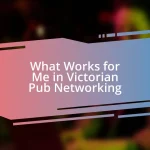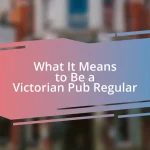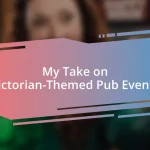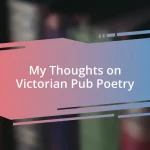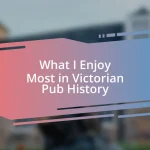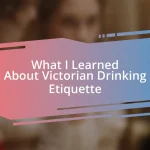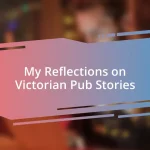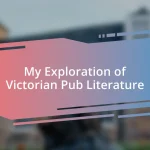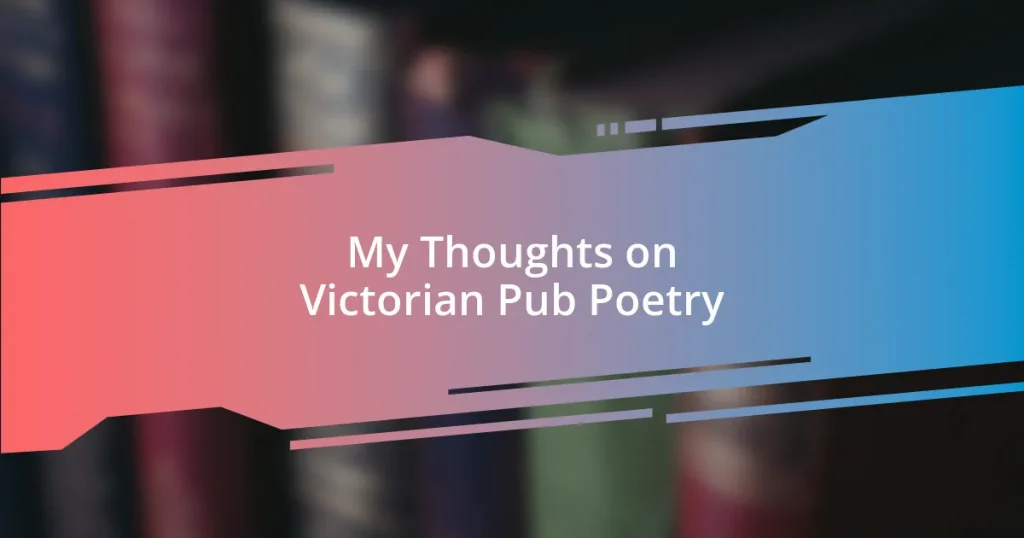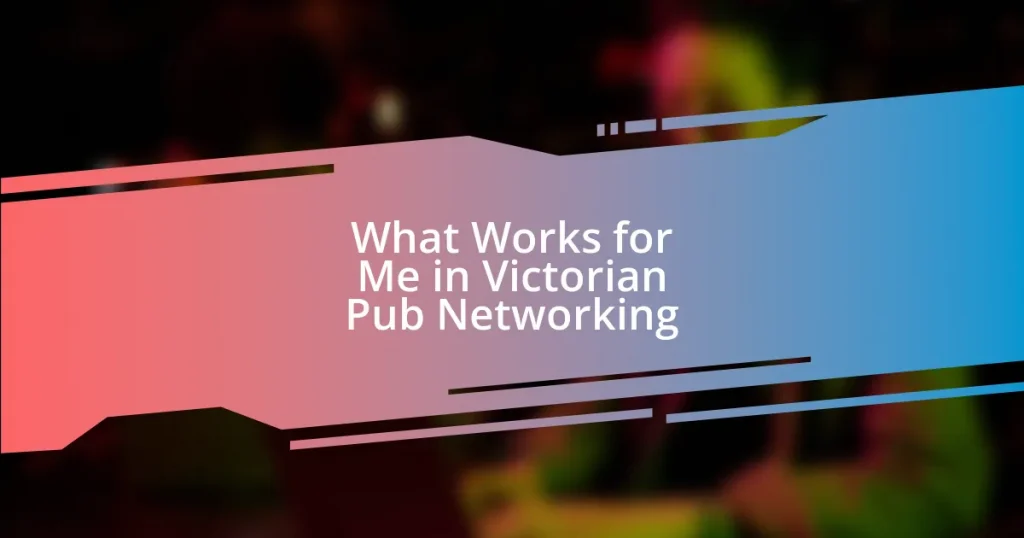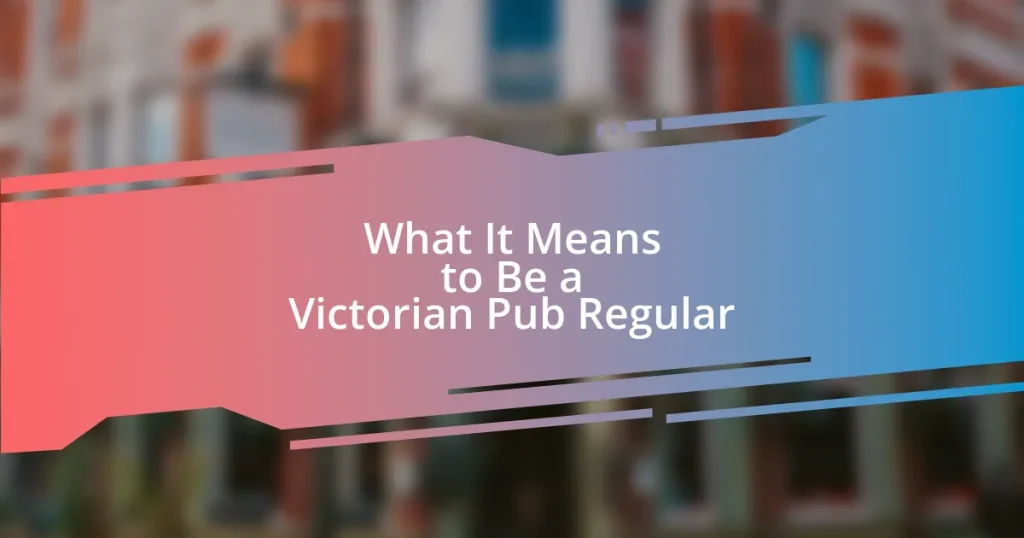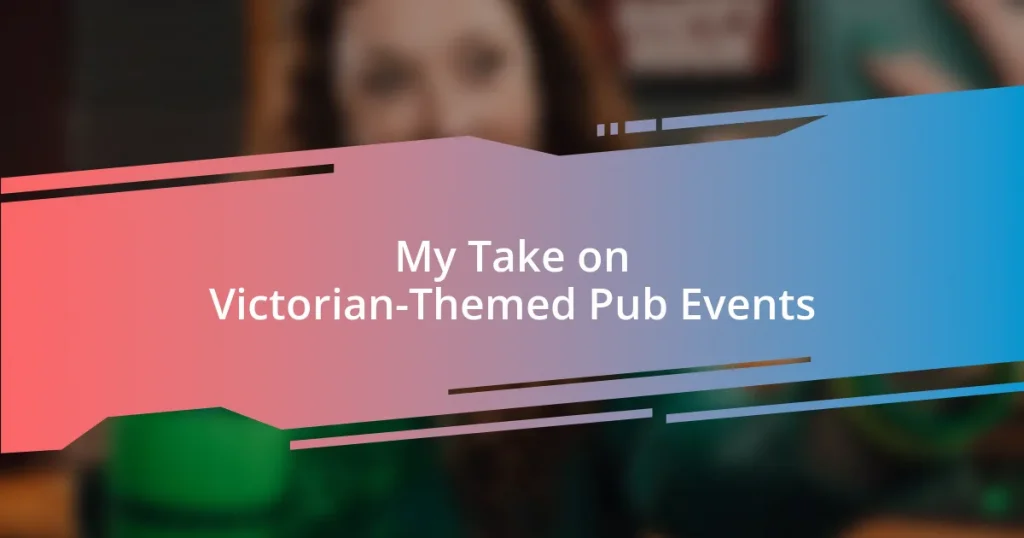Key takeaways:
- Victorian pub poetry served as a vital social hub for the working class, fostering community and creative expression in informal settings.
- The poetry often addressed social issues, love, and hardships, allowing poets to share relatable experiences and connect deeply with their audiences.
- Key features of Victorian poetry included vivid imagery, a focus on social themes, and structured forms like sonnets and ballads, all enhancing its emotional impact.
- Notable poets such as Alfred, Lord Tennyson and Robert Browning used their works to explore complex human emotions and societal challenges, inspiring ongoing discussions and reflections.
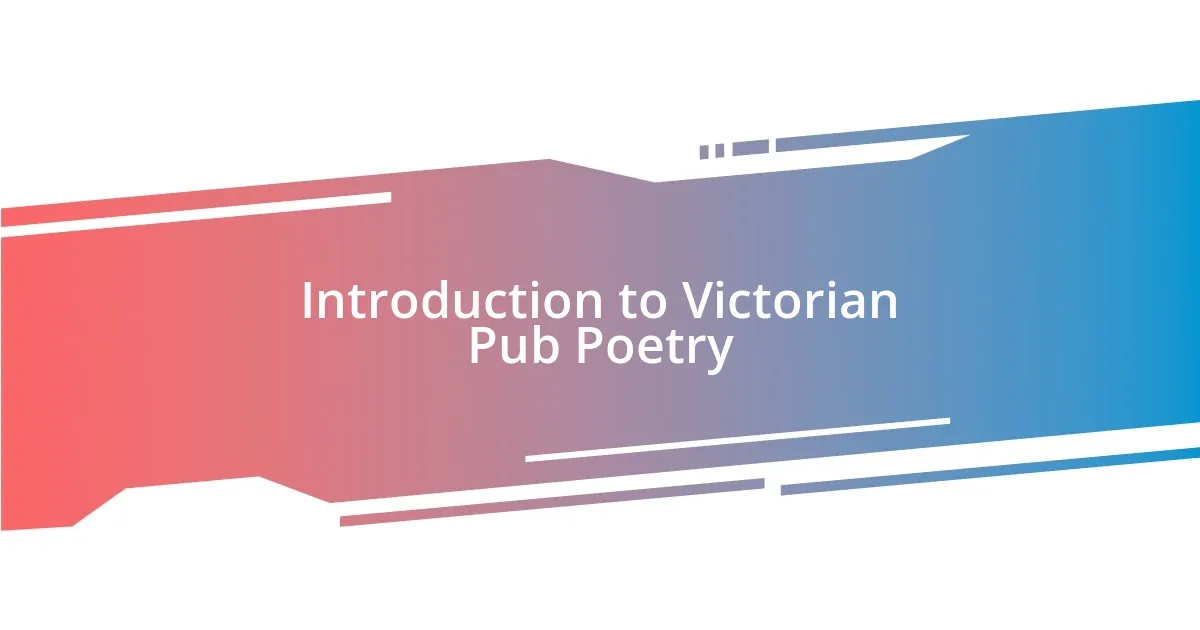
Introduction to Victorian Pub Poetry
Victorian pub poetry emerged as a unique form of expression during the 19th century, providing both entertainment and a sense of community. I recall attending a local pub open mic night once, where the warmth of camaraderie among the poets felt similar to the lively gatherings of the Victorian era. It makes you wonder: how did these informal settings shape the literary landscape of the time?
The poems recited in pubs often echoed the sentiments of the working class, addressing social issues, love, and everyday joys and struggles. I often find myself reminiscing about my own experiences with poetry in public spaces—there’s something magical about sharing raw emotions over a pint. Isn’t it fascinating how a simple drink can foster such deep connections through words?
Listening to the rhythmic verses penned by amateur poets in these cozy corners, one can almost feel the spirit of the Victorian age. It’s incredible to think about how these performances allowed poets to voice their thoughts in a world that was rapidly changing. I sometimes imagine what it must have been like for those poets to share their experiences and passions under the low light of flickering gas lamps.
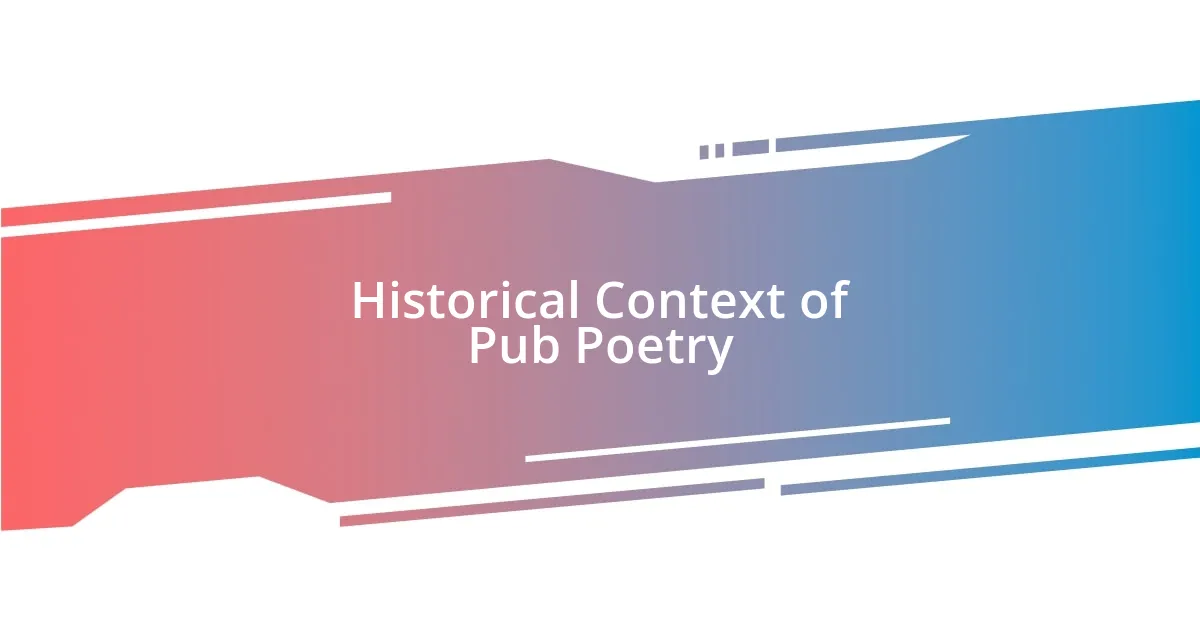
Historical Context of Pub Poetry
The historical backdrop of pub poetry is rich and vibrant. During the Victorian era, pubs served as a vital social hub, where the working class gathered to unwind and share their thoughts. These gatherings weren’t just about enjoying a drink; they became platforms for creative expression and cultural commentary. I can imagine the hum of conversations blended with the clinking of glasses, as poets crafted verses reflecting the lives of those around them.
- Pubs were central to community life, promoting interaction among all classes.
- The rise of literacy in the 19th century encouraged more individuals to engage in poetry.
- Poets often shared personal, relatable experiences, making their work accessible to many.
- Themes in pub poetry included love, hardship, and social justice, resonating with working-class struggles.
- Cozy atmospheres provided a sense of safety for poets to openly express their emotions.
When I picture these poets stepping up to recite their work, I can almost hear the applause and encouragement from their peers. It’s a reminder that even back then, vulnerability and creativity coexisted in such spaces, helping people connect over shared experiences. The intimate setting of a dimly lit pub truly became an incubator for heartfelt storytelling and the exploration of societal issues.
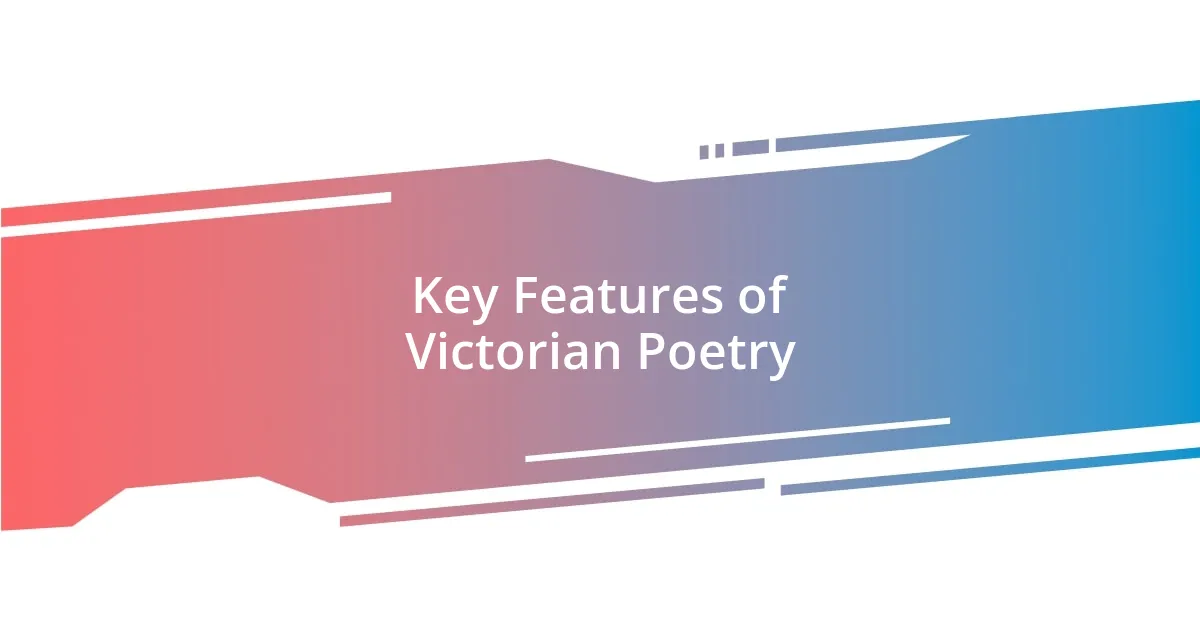
Key Features of Victorian Poetry
Victorian poetry is marked by its vivid imagery and emotional depth. I remember the first time I encountered a poem filled with intricate descriptions of nature; it felt as if I could see, hear, and even smell the world the poet was painting. This heavy reliance on sensory details allowed readers to connect deeply with the themes, creating an experience that transcended mere words. The intricate rhyme schemes often employed added a melodic quality. Doesn’t it strike you how music intertwines with our emotions?
Another key feature is the focus on social and moral issues. In my readings, I’ve often come across poets who dared to address topics like poverty and social justice. It’s intriguing how their words challenge the status quo, forcing society to confront uncomfortable truths. Reflecting on those themes often compels me to think about the poets’ courage to speak out in their time. How did they find the strength to articulate such powerful sentiments?
The structure of Victorian poetry also had its own charm, characterized by fixed forms like sonnets and ballads. I once took a workshop that emphasized these traditional forms, which felt oddly liberating yet constraining at the same time. Crafting within these boundaries sharpened my focus and challenged my creativity. Isn’t it fascinating how the rules of poetry can bind and liberate a writer simultaneously?
| Key Features | Description |
|---|---|
| Imagery | Vivid and sensory details create immersive experiences for the reader. |
| Social Themes | Focus on moral and social issues, reflecting the struggles and dynamics of society. |
| Structure | Utilization of fixed forms like sonnets and ballads provides a rhythmic quality and adherence to tradition. |
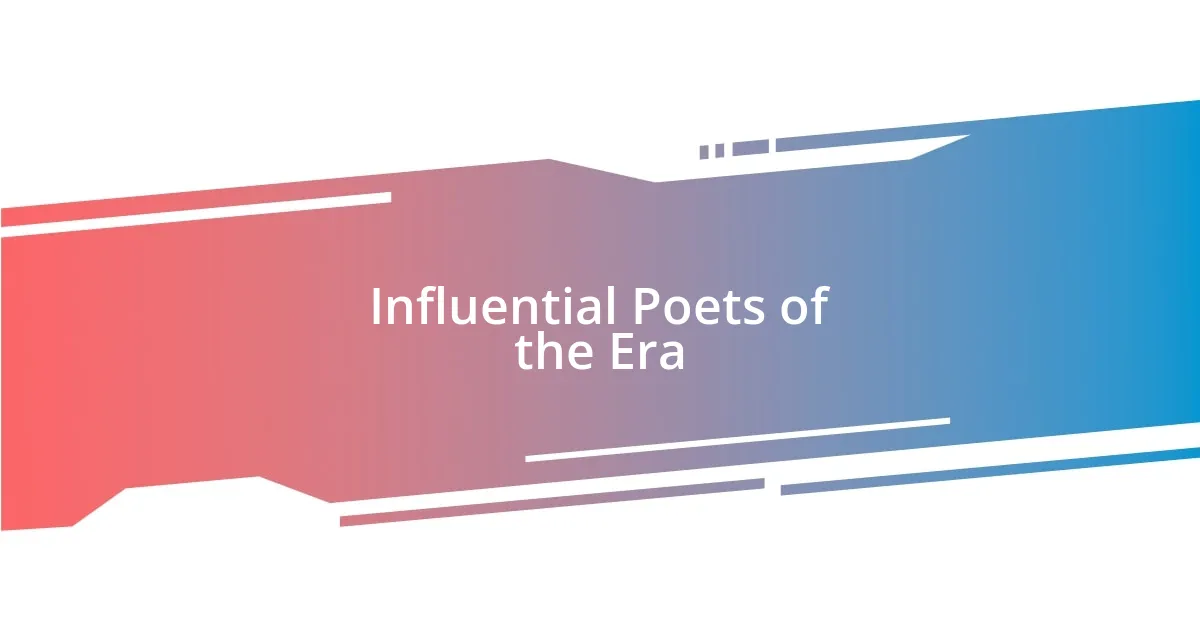
Influential Poets of the Era
One of the most influential poets of the Victorian era was Alfred, Lord Tennyson. His poem “The Charge of the Light Brigade” deeply moved me the first time I read it; the raw emotion and vivid imagery transported me into the very heart of the battlefield. Tennyson had a remarkable ability to capture the spirit of his age, and his reflections on duty and sacrifice resonated profoundly with the working-class audiences in pubs, echoing their struggles and hopes.
Then there’s the lesser-known poet, James Thomson, who really shook things up with his work “The City of Dreadful Night.” I remember feeling a chill run down my spine as I absorbed the despair woven through his verses, making me acutely aware of the stark realities faced by many Victorians. His vivid portrayal of urban life and its darker undertones provided a platform for essential conversations in those cozy pub settings. Doesn’t it amaze you how poetry can illuminate the shadows of life in just a few stanzas?
Lastly, I can’t help but mention the lively energy of Robert Browning, particularly in his dramatic monologues like “My Last Duchess.” The first time I encountered it, I was captivated by his characters’ voices—the way they drew you in and made you a silent participant in their stories. It’s fascinating to think that reciting such deeply personal work in a bustling pub could forge connections among listeners, creating a community built on shared emotions and thoughts. Wouldn’t you agree that the complexity of human nature, as expressed by poets like Browning, continues to inspire meaningful discussions today?
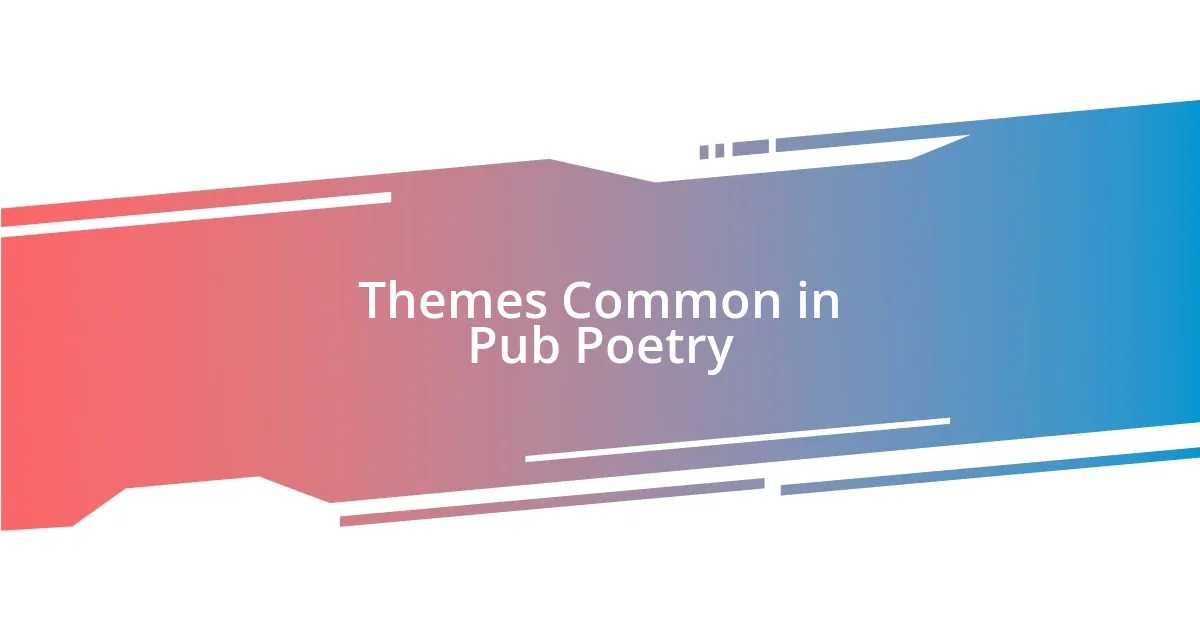
Themes Common in Pub Poetry
Pub poetry often weaves social commentary into its fabric, reflecting the lives and struggles of common folks. I recall a night at a local pub where a poet recited verses about working-class struggles, igniting conversations among patrons. It reminded me of the power of poetry to bridge gaps—don’t you think it’s incredible how shared experiences can spark a sense of community?
Another prominent theme is nostalgia, often expressed through personal memories and reflections. When I listen to poems that reminisce about simpler times, I can’t help but get lost in my own memories. The way poets capture fleeting moments evokes emotion in listeners, drawing them into stories that feel universal. Have you ever felt that rush of sentimentality from just a few well-chosen words?
Humor also plays a significant role in pub poetry, providing a light-hearted escape from daily hardships. I remember laughing heartily when a poet cleverly used wit to describe the absurdities of life. In a cozy pub setting, this blend of humor and storytelling creates an atmosphere where everyone can relate and unwind. Isn’t it delightful how laughter can uplift spirits and forge connections among strangers?
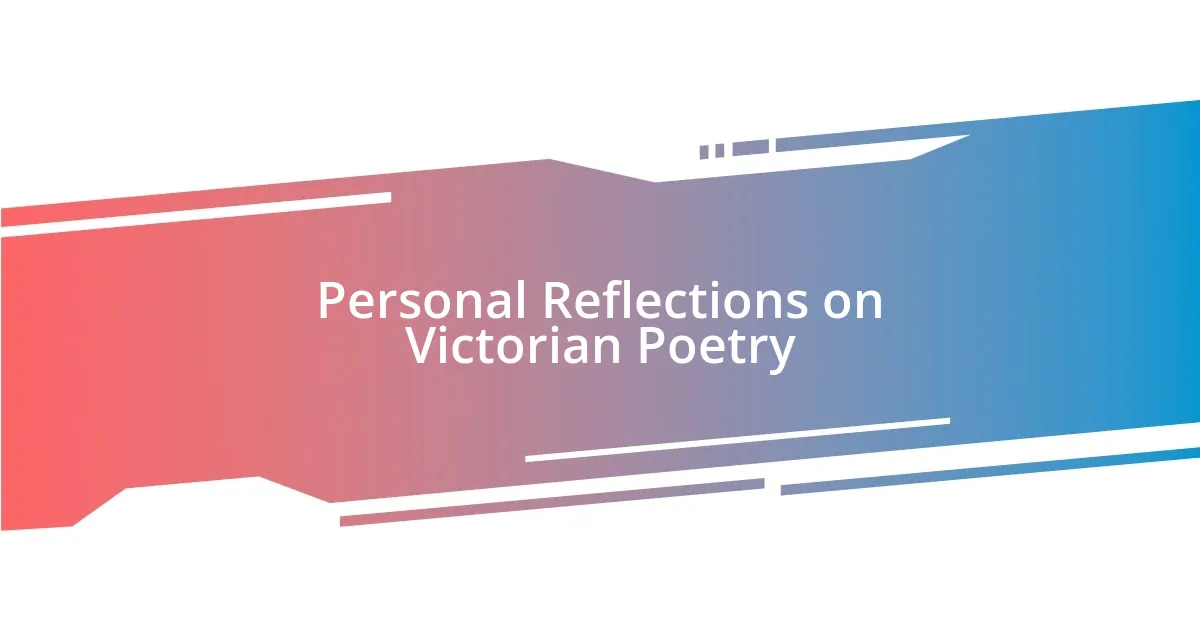
Personal Reflections on Victorian Poetry
There’s something truly captivating about the rhythm and themes found in Victorian poetry that resonate with me. I remember once sitting in a dimly lit pub, surrounded by warm laughter and clinking glasses, when a passionate poet recited an excerpt from Elizabeth Barrett Browning’s work. Her exploration of love and longing poured through the air, and I could feel the collective sigh of appreciation from everyone in the room. In that moment, the walls of the pub seemed to fade away, and we all shared a profound connection anchored in human emotion.
Reflecting on Victorian poetry, I often find myself drawn to its rich tapestry of societal issues. One evening, a poet shared lines about the struggles of women in the 19th century, and I could see the nods of empathy among my fellow listeners. It struck me how these verses illuminated not just the historical context but also the ongoing fight for equality today. Doesn’t that spark a sense of resolve within us, knowing that the words of the past continue to inspire change?
I also cherish the moments of levity within Victorian poetry, as I find humor can provide much-needed respite. There was a night when a poet cleverly weaved in clever puns and playful jabs at the rules of society, prompting bursts of laughter that made the pub feel alive. These light-hearted verses not only entertained but also reminded us not to take life too seriously. Don’t you think that blending humor into serious themes is a wonderful way to foster resilience among us?
